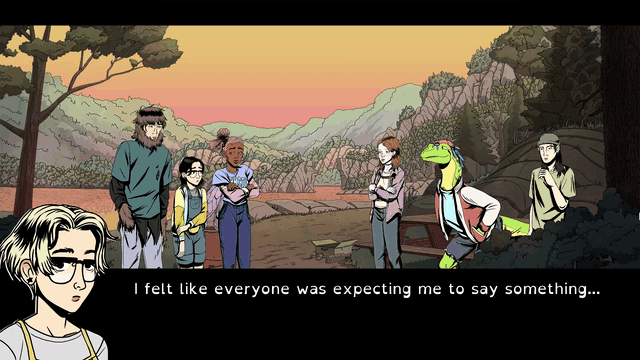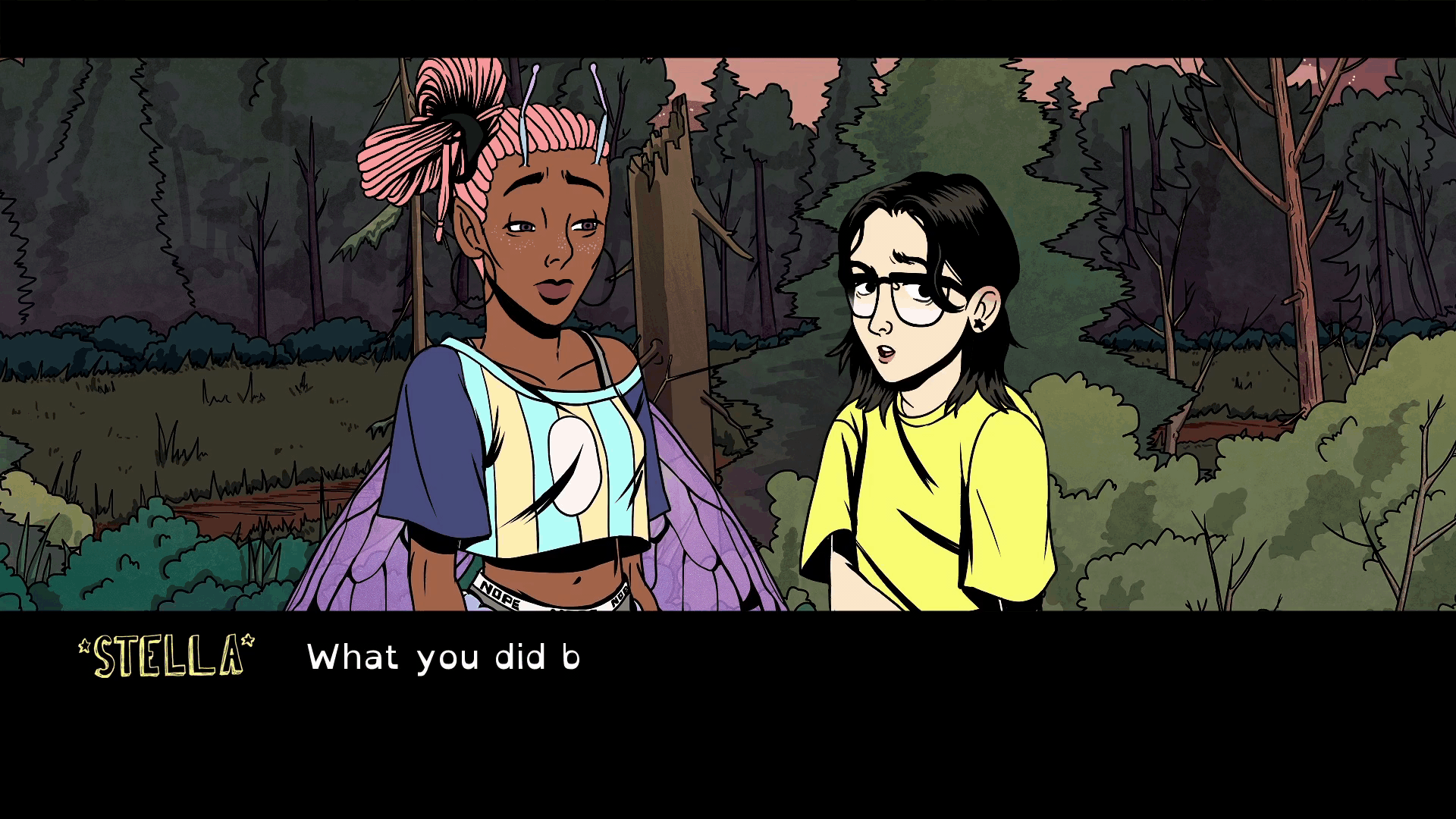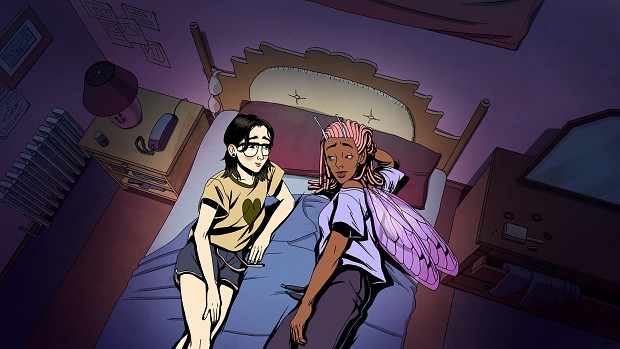Raptor Boyfriend: A Postmortem
This postmortem is about trying to identify what happened during the development of Raptor Boyfriend. What were the challenges? What were the decisions that led to positive, neutral and negative outcomes? These can be decisions that were made unconsciously or made through indecisiveness. We will be pointing these out in order to learn from them and hopefully apply what we learn to future projects.

A bit about "mistakes":
We’ll be using the word mistakes a lot in this postmortem. Not because a ton of them were made, but because pointing them out is useful to help us avoid making them again. It’s important to remember that making mistakes is the best way to learn and it’s not purely negative when they happen. That being said, it’s unavoidable that the term is largely viewed as a negative and it doesn’t feel good to hear when you’ve made them. But let us preface this talk with this: We tried our best with this game and our mistakes are forgivable and understandable.
Understanding Raptor Boyfriend: A High School Romance
The first step is to try to understand what RBF is. It's one part consumer product/ business venture, one part art, and one part personal project. As a consumer product/business venture, it is satisfying to those who bought it, being sold for $13.95 USD, but it's selling below our expectations. As a piece of art it has been appreciated by a large majority of people that play it. Reviews are mostly very positive, and even when the humor of the game isn't appreciated, the heart of it is. It has been validating for queer people, people that experience anxiety and outsiders in general. It has also been credited with being a worthy entry into the dating sim and VN genre. As a personal project it has been a mixed bag. The validation from critics/players has been great, but hard to reconcile with the lack of financial success. It was for the most part fulfilling artistically but like any project with a long development, by the end it felt restricting. The length of the project also led to exhaustion and a lack of motivation.
As a consumer product/ business venture alone, RBF struggles to compete with other games within its genre and was a financial failure (at launch). But as art alone, it's a net positive. It has improved the lives of those who have played it and contributed positively to the genre it's in (BIG success). As a personal project it becomes harder to quantify with feelings still being very fresh. It'd be worth looking back at RBF after some time to gain more perspective.
The Development
Ideation phase (Oct 2018- Dec 2018)
During this phase we took a pre-existing concept for the Raptor Boyfriend animated show which was briefly being workshopped to become 1-2 min animated shorts and morphed into a visual novel.
RBF then:
- It was planned to be a 3-4 hour VN that would establish us as game developers and allow us to learn what making a game would be like.
- Development was estimated to take roughly 1 year.
- The story focused on a love triangle between Stella, Robert and Taylor.
- The engine being looked at was TyrannoBuilder.
Mistakes:
- The assumption of the game being short in playtime and development was made without fully examining how to achieve those goals. (ie how the loose concept of the story affected the scale of the game.)
- Diversity within the cast was not fully considered at this stage.
- The genre of VNs was not well known by us at the time which led to us making assumptions about what type of games were selling, what the competition was and what made for a satisfying VN experience.
- A firm plan/schedule for development was not in place.
- We were overly committed to the loose story concept too early on and didn't consider whether it would make a good game.
Good Choices:
- The intention of making a smaller game for our first attempt was good.
- Diversity was at least considered.
- Choosing a genre of game that focused on our strengths as creators, which was writing and visuals.
- We chose a project that we were very personally invested in, which helped us stay motivated and make something unique and interesting.
- We kept this stage low pressure, which helped us recover from burnout from our last project, and made for a highly creative atmosphere.
Pre-Production (Dec 2018 - Sept 2019)
We refined the visual designs of the characters and started work on layouts and backgrounds.
We made several prototypes in various engines and gameplay designs including a version with a Facebook-type app within the game, a version where Stella's personal development was gamified (i.e.: believe in self, go with the flow etc.) and the first episode was built with point and click sections for every scene.
We wrote a bible for each character (wants, needs) and an outline for the story.
RBF then:
- Still planned to be a 3-4 hour VN that would establish us as game developers and allow us to learn what making a game is like.
- The development time was obviously going to be over a year now, but we only started to make a new plan in September of 2019. The plan was that we'd write the game by the end of the year, then build it over the course of 2-3 months and have it ready for release by February 2020.
- The story was loosely planned, but still mainly focused on a love triangle. It had expanded to allow you to choose Taylor as a romanceable route.
- The game had been built in TyrannoBuilder and VN builder until we settled on Ren'Py
- Most character designs were finalized, but the different outfits and poses were complete yet.
- BGs were still in the rough phase, but some 3D reference layouts were done.
Mistakes:
- Not reformulating our development plan once it was clear our original plan didn't work.
- When we did make a new plan, it was unrealistic:
- We wanted to make the game smaller after prototyping EP1, but didn't scale down enough to make having it done in February 2020 possible.
- We made a plan that required crunch and was about "just getting it done", which led to rushed work we were later unsatisfied with.
- It was discussed, but a specific design philosophy was never really explored or discussed between the art department.
- We got lost in pre-pro a bit which isn't a mistake we made consciously, but the process had no solid deadline which may have contributed to some of the aimlessness.
NOTE: It's hard to say what went wrong over all here. This phase took longer than expected (1 year), but that's understandable considering we were new to game development. Decisions took a bit too long to make, for instance deciding on the engine. But the engine needed to be tested and that takes time. It seems like other than committing to choices faster/ having a system for resolving differing opinions, we just needed to understand that pre-pro was taking a long time and account for that.
Good Choices:
- Choosing Ren'Py was probably the best choice out of the engines we considered and with the planned scale of the game at the time
(shout out to Titus for finding, learning and testing all those engines).
- Taking the time to make sure that the character designs were solid paid off big time
(special shout out to Lindsay for making the characters so appealing and rising to the bizarre challenges that this game presented).
- Making a layout for each scene in 3D helped the BGs look better and helped us avoid blocking issues later.
- We realized the scope of the game was too big and scaled down early.
- Making prototypes helped us understand the scope of the game as well as what each engine could do and how well gameplay concepts worked.
- We made Order A Pizza which gave us perspective, experience finishing games and some acquaintances in the industry.
Writing detour (Sept 2019 - Dec 2019)
We rewrote/ redesigned the game to be significantly shorter and smaller than it was originally.
We cut out the point and click sections that were planned for each scene and only left the hub/bedroom sections.
We split the story into scenes and assigned the writing work equally between the three of us.
During the 2nd draft of the writing process, we decided that Day should be a romanceable character.
Once the writing was done, we read it over and critiqued it.
Mistakes:
- We didn't have a solid idea about the gameplay mechanic before writing which caused issues, since the gameplay and writing are intertwined. (we tried to reinvent the wheel when it came to how VNs work)
- The approach of dividing the game into scenes and then writing them separately caused issues with consistency, tone and pacing.
- We scaled the game down too much for the story we were telling and caused it to feel as if it had no middle.
- If we wanted to have the game be as short as we were planning, we needed to fundamentally change the story and come up with a framing device that lent itself to the scale we were aiming for.
- We didn't establish the time in which each episode and scene was taking place, which made the game feel structureless and hurt the sense of character development.
Good Choices:
- Making Day a romanceable option and developing her character was one of the best decisions that we made.
- Taking the time to critique what we'd been writing and doing so honestly helped us make the game what it is today.
- Getting rid of the point and click sections (and an abandoned idea for Q&A sections) helped make the game more focused and improved the pacing.
- Keeping the HUB(kitchen and bedroom scenes) helped make the game's production value stand out to those who played it.
Production (Jan 2020 - April 2021)
We made a solid plan for the rest of production that, while unrealistic, had a structure that we could follow and then gauge our progress as we adjusted and made new plans as we went along. It is also worth noting that having lost our part-time jobs due to covid and relying on the Canadian Emergency Relief fund allowed us to start working on the game full-time for the first time.
In this stage we re-wrote the game nearly entirely for a third time, including the outline, more character backstory, Ladle lore and the actual scripts.
We pitched the game to publishers, applied for grants and sought other opportunities like indie events and showcases.
We finished all the remaining artwork and music.
We developed a system for building the game in Ren'Py and then finished all the coding.
We made major story edits after playing through the first alpha version of the game and critiquing it
(special shout out to Titus for having the some most insightful critiques for both major writing reviews).
Mistakes:
- Our plan to release the game in the summer of 2020 was unrealistic and put unnecessary pressure on everyone.
- We were still rushing, which led to the decision to not make a demo early on. This hurt our ability to apply to events, pitch to publishers and get feedback from players.
- Our marketing plan was lacking in several ways:
- We didn't start sharing the game until midway through production, which led to more difficulty when it came to gathering wishlists.
- We struggled to maintain momentum and motivation when it came to marketing, leading to a lot of the work falling on Lindsay.
- Our strategy when it came to build sharing was clunky, leading to confusion and frustration when it came to consolidating the builds.
- Near the end of production, the schedule became too aggressive.
Good Choices:
- Deciding to take another pass at the writing helped the game become what it is today
(special shout out to Pat for writing the "Raptor Boyfriend Current State" document and coming up with the overall writing and production plan).
- There were countless good decisions when it came to the writing. We fixed most of the problems with it in the third draft phase.
- We solidified the gameplay as a Dating SIM and used a tried and true gameplay design that we were resistant to earlier.
- Coming up with the collectibles idea made for a touch of originality within the gameplay.
- Although we were still rushing for most of this phase, we mostly took the time necessary for each part of the process.
- By the end of this phase, we did some self-reflection and realized that our health was more important than deadlines, which helped us understand the type of studio we'd like to be.
Post- Production (April 2021- Release)
We finished any last-minute work and started beta testing.
We prepared for release by making marketing materials like the trailer and a collection of contacts to send the game to for reviews/coverage on launch day.
NOTE: This section is sparse and I won't be going over our mistakes and good choices for several reasons:
- We're too close to this part of the process to have the proper perspective and the feelings related to it are too fresh.
- We can't apply many of the lessons that we might learn because of how far we are from this part of the process with our next project.
- It feels unnecessarily harsh to critique choices we've just made.
It would be worthwhile to take a closer look at what happened during this phase of the project after we've had more space.
For now, all we need to know is we tried our best for the time and energy we had.
What can we take away from this?
- WE WERE NEW! That being said, we made a lot of great choices that were very perceptive while we were still very new to making games.
- A common issue was making plans that required crunch to be doable instead of taking the time to realistically examine the amount of work something would take, and then either make cuts, or account for the proper amount of time.
- We first thought we'd spent too much time in pre-production, but we're less sure that's true now. If anything, there were steps we skipped that could have helped the game early on.
- The game changed a lot. We're of two minds when it comes to this:
- 1. It was good that it was malleable, because that allowed us to make it better.
- 2. We could have nailed down the core of the game earlier to keep it strong and focused (for example: It's called Raptor Boyfriend and you don't have to date the Raptor).
- We work really well when we have a structure to development, but structure has to account for things to change.
- Taking the time to look at what the game was at key points. First draft edits and alpha testing helped in major ways.
- When we get busy, disorganized or overwhelmed, work tends to spill out to Lindsay due to her discipline, which is a mistake that we NEED to avoid making in the future.
- Marketing starts in the ideation phase. Understanding how marketable the project is and whether there even is a market for it is super important.
- Not making a demo and seeking funding earlier hurt our chances of making the game financially viable.

Thanks for taking the time to read our post-mortem on Raptor Boyfriend: A High School Romance! The lessons learned through its development is and has been invaluable to our experience as a studio and we are excited to apply those lessons to our future projects moving forward. We strive to continue making great games and we hope you are excited to play and experience them too!




